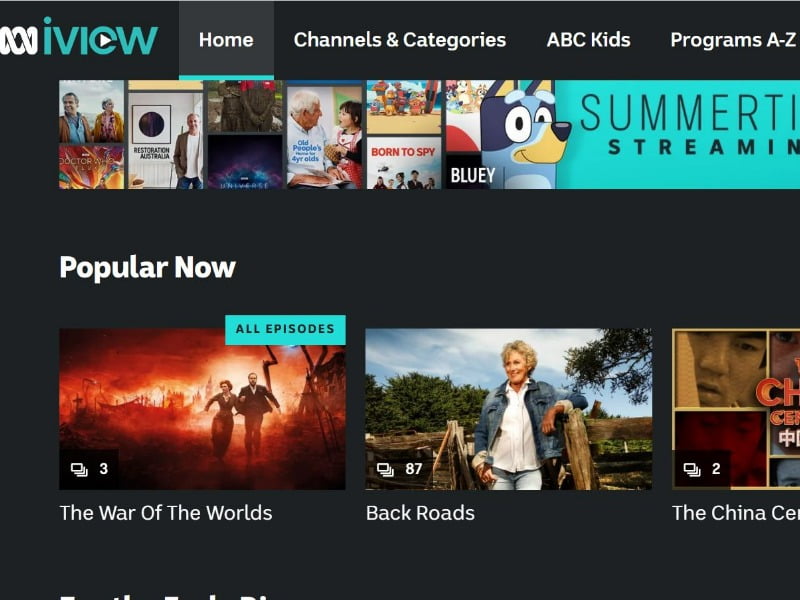The ABC will require users of its iview streaming service to log-in to continue watching this year, and will share their data with tech giants by default, despite repeated warnings from privacy experts.
The national broadcaster last year delayed the mandatory log-in requirement following concerns about user data collection and how it is being shared with third parties.
An updated privacy policy was released in December to explain the process and the ABC has confirmed it will require log-ins within months. But privacy experts have warned user data is being collected and shared with Facebook and Google without active and informed consent, a potential breach of Australian privacy law.

The ABC confirmed it would introduce mandatory logins “in the next few months” through a staged rollout process in order to “keep up” with global streamers like Netflix, commercial broadcasters and the SBS, which all require user accounts.
“Personalised services are fast becoming an expectation for audiences in the modern media age, rather than a ‘nice to have’,” a spokesperson said.
“Failing to keep pace with user expectations could lead to a danger that our Australian stories get lost in the mix, or don’t get told at all; and that our sense of shared national identity is thereby diminished.”
The national broadcaster was criticised last year by data and privacy experts as well as some politicians when it first revealed plans for mandatory logins and more data collection.
It delayed the plans more than six months and has been working with the privacy watchdog and ombudsman on how to handle the surge in user data mandatory log-ins will create.
According to the ABC, log-ins are needed to provide “personalisation” features like recommendations, watchlists and playback resumption across devices, and there is an appetite among its users for the features.
Privacy expert Anna Johnston has criticised the move, saying the practice of user tracking and data sharing has no place at the national broadcaster.
“This type of exploitative data extraction and surveillance capitalism has no place on our beloved Aunty,” Ms Johnston, founder and principal of Salinger Privacy, wrote last week in a company blog post examining the changes.
“Australians don’t want to be tracked online. Our public broadcaster should not be sharing data about its viewers and listeners with global tech behemoths without our active and informed consent. Aunty’s job is to tell us stories, not tell stories about us to Facebook and Google.”
The ABC this week confirmed viewers accessing iview through a web browser will be able to do so without logging in but other devices like smart tv’s will require an account to be created and used.
Data will be collected on these users’ viewing habits and it will be shared with Google and Facebook through hashed emails for the purpose of advertising to them on those platforms. But the ABC claims the tech giants won’t actually have any decipherable information about viewing habits.
“Rather, Google and Facebook are instructed what ABC promotion to show to a particular group of account holders on their platforms,” the spokesperson told InnovationAus.
“Google and Facebook only have capacity to serve that promotion if the ABC Account Holder uses the same email address to log in to their ABC account as they use to log in to their Google or Facebook account.”
The spokesperson added that the ABC’s contracts with the two companies do not allow them to use the data for any other purpose.
Ms Johnston said the hashed email protection is a privacy “furphy” because companies using the same hashing algorithm can unscramble them relatively easily when users use the same email address, which is common.
“The fact that no ‘names’ or even ‘real’ email addresses are exposed in the middle of the data-sharing process makes no difference to the end privacy impact, which is that you will be shown specifically targeted ads or other forms of personalised content, because of the richness of the information about you that has been shared between companies, behind your back,” Ms Johnston said.
“In this case, the ABC has clearly admitted that what it is doing is giving information about its viewers and listeners to Facebook and Google.”
Registered iview users will be able to opt out of the data sharing with Facebook and Google but will need to manually disable the option in their settings, which is defaulted to ‘on’. The ABC spokesperson did not directly answer why data sharing was on by default.
The new privacy policy also states information about unregistered users’ devices “may” also be collected and shared with Google and Facebook to target advertisements. The spokesperson said the ABC is “not using” them currently.
While the ABC is attracting criticism for requiring log ins, it insists it is “is aiming to be an industry leader in privacy”.
“Nothing about creating a login for ABC iview changes our editorial independence, integrity or responsibility, including the privacy and data protections people expect of the ABC.”
Do you know more? Contact James Riley via Email.

